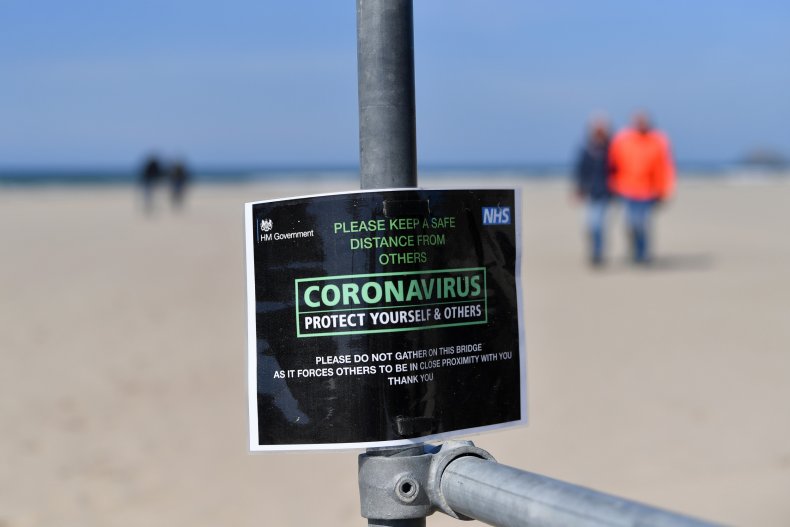A man in the U.K. broke lockdown rules and went on a 170-mile drive in his BMW on Easter Sunday because he needed a “break” from his wife and children, police said.
Officers stopped the motorist near Launceston, Cornwall and inquired about the reason for his journey. Police said he was reported after he apparently told them he wanted some time away from his family—a violation of the restrictions in place to stop the spread of the coronavirus in the country.
“Taking your BMW out for a spin on a 170 mile round trip to have a break from the wife and three kids is also not an essential journey,” Devon, Cornwall and Dorset Roads Policing Teams wrote on Twitter. “The roads are much quieter but there are still people who don’t get it.”
Taking your BMW out for a spin on a 170 mile round trip to have a break from the wife and three kids is also not an essential journey! The roads are much quieter but there are still people who don’t get it. Driver reported on the A30 near Launceston. 6648 pic.twitter.com/wkatvjHMQj
— Alliance Roads Policing📱 🚗=⌠(@RoadPolAlliance) April 12, 2020
Earlier that day, the police force said it had dealt with people who had driven to Cornwall for a weekend getaway.
“A weekend break in Cornwall is not essential. Two vehicles turned around and drivers dealt with within five minutes of setting up. To everyone else, thank you for staying at home,” the force tweeted.
Later that same day, the force reported another incident where a motorist also broke lockdown rules to drive across the country to pick up a boat—then broke down.
“Driving across the county (and then breaking down on a hill) to collect the second hand boat you just bought is not an essential journey either,” police wrote on Twitter.
The incidents came as U.K. Prime Minister Boris Johnson was discharged from hospital on Sunday after recovering from COVID-19, the disease caused by the novel coronavirus.
In a video posted on Twitter, Johnson thanked Brits for staying at home over the Easter weekend but urged them to continue following social distancing guidelines as “the struggle is by no means over.”
The U.K. is in its fourth week under lockdown, with people permitted to leave their homes only for a few reasons, such as shopping for necessities, one form of exercise per day, for medical or health reasons or to travel to and from work—but only if they cannot work from home.
Last month, police in the U.K. were given powers to issue fines to those breaching the government’s guidelines on social distancing. Officers can hand out a £60 ($75) fine for a first offense, £120 ($150) for a second offense and double the amount on each additional offense.
The U.K. has more than 89,000 confirmed cases of COVID-19 and more than 11,000 deaths, according to Johns Hopkins University. More than 300 people have recovered.
Centers for Disease Control and Prevention Advice on Using Face Coverings to Slow Spread of COVID-19
- CDC recommends wearing a cloth face covering in public where social distancing measures are difficult to maintain.
- A simple cloth face covering can help slow the spread of the virus by those infected and by those who do not exhibit symptoms.
- Cloth face coverings can be fashioned from household items. Guides are offered by the CDC. (https://www.cdc.gov/coronavirus/2019-ncov/prevent-getting-sick/diy-cloth-face-coverings.html)
- Cloth face coverings should be washed regularly. A washing machine will suffice.
- Practice safe removal of face coverings by not touching eyes, nose, and mouth, and wash hands immediately after removing the covering.
World Health Organization advice for avoiding spread of coronavirus disease (COVID-19)
Hygiene advice
- Clean hands frequently with soap and water, or alcohol-based hand rub.
- Wash hands after coughing or sneezing; when caring for the sick; before, during and after food preparation; before eating; after using the toilet; when hands are visibly dirty; and after handling animals or waste.
- Maintain at least 1 meter (3 feet) distance from anyone who is coughing or sneezing.
- Avoid touching your hands, nose and mouth. Do not spit in public.
- Cover your mouth and nose with a tissue or bent elbow when coughing or sneezing. Discard the tissue immediately and clean your hands.
Medical advice
- Avoid close contact with others if you have any symptoms.
- Stay at home if you feel unwell, even with mild symptoms such as headache and runny nose, to avoid potential spread of the disease to medical facilities and other people.
- If you develop serious symptoms (fever, cough, difficulty breathing) seek medical care early and contact local health authorities in advance.
- Note any recent contact with others and travel details to provide to authorities who can trace and prevent spread of the disease.
- Stay up to date on COVID-19 developments issued by health authorities and follow their guidance.
Mask and glove usage
- Healthy individuals only need to wear a mask if taking care of a sick person.
- Wear a mask if you are coughing or sneezing.
- Masks are effective when used in combination with frequent hand cleaning.
- Do not touch the mask while wearing it. Clean hands if you touch the mask.
- Learn how to properly put on, remove and dispose of masks. Clean hands after disposing of the mask.
- Do not reuse single-use masks.
- Regularly washing bare hands is more effective against catching COVID-19 than wearing rubber gloves.
- The COVID-19 virus can still be picked up on rubber gloves and transmitted by touching your face.



















